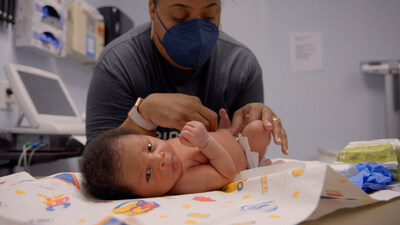Over 50 cities to broadcast moving documentary centered on the disparities in Black maternal health produced by Women in the Room Productions
LOS ANGELES, CA— — New federal data reveals the unfortunate truth for Black mothers across the country – as the national maternal mortality rate rose during the pandemic, Black mothers are three to four times more likely to die from pregnancy related causes than their white counterparts.
Viewers can learn more about these disparities – and experience moments of resilience and joy – by tuning in to select PBS stations during Black Maternal Health Week (April 10-17) to watch “Birthing Justice.” The powerful documentary goes behind the statistics and beyond the grief to amplify how Black women are taking control of their lives and transforming birth experiences for generations to come.
“Birthing Justice is the film I wish I had before I started a family,” said Allyson Felix, 11-Time Olympic Medalist, co-founder and president of Saysh and executive producer of “Birthing Justice.” “It takes an in-depth look at the horrifying statistics of giving birth for Black women and unpacks the complexities of changing these outcomes. It was important for me to share my story alongside other powerful accounts so that my daughter and her generation won’t face these same issues.”
Viewers in over 50 cities across the country can access the documentary by tuning in to their local PBS station the week of April 10. See the list of air dates here in addition to information on how individuals and communities can host their own “Birthing Justice” watch party.
After watching the documentary, viewers can use this thought-provoking discussion guide, provided by The Opportunity Agenda, a social justice-oriented, nonprofit communications community, to empower conversations about Black maternal health with friends, family and community members.
“Birthing Justice” is produced by Women in the Room Productions, a comprehensive media company that drives social impact for women and people of color through storytelling and community. Support for the film was provided by the W. K. Kellogg Foundation, Missouri Foundation for Health, Meadow Fund, Robert Wood Johnson Foundation and others.
 Westside Story Newspaper – Online The News of The Empire – Sharing the Quest for Excellence
Westside Story Newspaper – Online The News of The Empire – Sharing the Quest for Excellence





